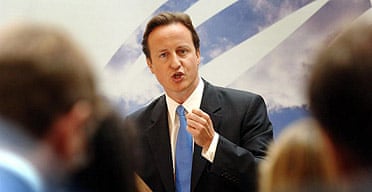David Cameron is now Britain's least popular party leader, liked less than Gordon Brown or Sir Menzies Campbell, according to a Guardian/ICM poll published today. It suggests Mr Cameron's efforts to revive Conservative fortunes are suffering in the face of recovering respect for Labour as a party of government.
The poll was largely carried out after news of the Northern Rock crisis broke, which might have been expected to harm Mr Brown. Instead it offers bad news across the board for the Conservatives. Public satisfaction with Mr Cameron's leadership has slipped while the party has lost its advantage on major policy issues including crime, the environment and taxation.
Despite the bank crisis, Labour's lead as the party with the most trusted policies on the economy has grown since the start of the year. Voters may be reluctant to consider a change of government in a time of uncertainty.
Support for Labour in a possible general election has reached the symbolic 40% mark, up one point on last month's Guardian/ICM poll. The Conservatives have fallen two points to 32%, a level last reached in July. This deficit is the biggest in any ICM poll since David Cameron became leader at the end of 2005.
Sir Menzies Campbell, who speaks tomorrow at the close of the Liberal Democrat conference in Brighton, will be relieved by a two-point rise in Lib Dem support to 20%.
Labour's increased lead follows a series of polls suggesting that the gap between the two main parties had narrowed after the summer. It may revive talk about a snap general election - although the prime minister's team has played down the possibility, and the troubles at Northern Rock and the return of foot and mouth would make an early contest awkward.
If today's results were translated into votes, Labour could hope for an increased majority with about 380 seats. The Tories might slip back - although the effect of local campaigning and regional variation make exact predictions unreliable.
Until now Mr Cameron has been a strong asset to his party, liked by many voters who were otherwise unsure about the Conservatives. That appears to be changing, however; only 37% of all voters now say that they are satisfied with the way he is doing his job - against 45% who claim to be dissatisfied.
Sir Menzies Campbell has a slim advantage over Mr Cameron in terms of popularity: 41% of voters say they are dissatisfied with him against 36% giving him the thumbs up. His net deficit among voters - five points - is slightly lower than Mr Cameron's. By contrast, Mr Brown is still widely popular after less than three months in the job: 55% of all voters say that they are satisfied with his performance, against 23% who say they are not - a net positive rating of 32 points.
Labour supporters are also much keener on Mr Brown than Lib Dems are on Sir Menzies or the Tories are on Mr Cameron. The prime minister has a net positive rating among Labour backers of 73 points.
Sir Menzies remains popular with many Liberal Democrats, with a net positive rating of 48 points. In contrast Mr Cameron is in trouble among Tory voters, with a net positive rating of only 25 points. Among people who voted Conservative in 2005, only 54% are satisfied with the job Mr Cameron is doing. It may be that many traditional Tory voters are unhappy about the changes he is making to the party.
It is too early to tell whether current Conservative weakness will last, or whether it is a short-term result of Mr Brown's arrival at No 10. Polls suggested last year that Mr Cameron might appeal more than Mr Brown; instead the reverse has turned out to be the case.
Similarly Mr Cameron's efforts to reposition his party do not appear to have widened its pool of potential support. While 62% of all voters say they would either definitely vote Labour at a general election or pick the party as their possible second choice, and 56% say they might vote Lib Dem or pick it as a second choice, only 50% say they would consider voting Conservative.
That means Mr Cameron will find it harder than Mr Brown to gather enough votes to win a majority.
Only a quarter of current Labour and Liberal Democrat supporters say they might vote Tory instead. Around half of them say that they might move from Labour to the Lib Dems, or vice versa. That suggests the so-called anti-Tory progressive consensus remains a reality.
ICM interviewed a random sample of 1,005 adults aged 18+ by telephone between 13th and 16th September 2007. Interviews were conducted across the country and the results have been weighted to the profile of all adults. ICM is a member of the British Polling Council and abides by its rules.
Polls
Labour share (%) 40 (+1)
Brown's approval rating (all voters) +32
Brown's approval rating (Labour voters) +73
Conservative share (%) 32 (-2)
Cameron's approval rating (Tory voters) +25
Cameron's approval rating (all voters) -8
Lib Dem share (%) 20 (+2)
Campbell's approval rating (all voters) -5
Campbell's approval rating (Lib Dem voters) +48
